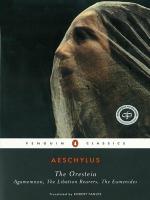|
|
The Libation Bearers Author/Context
Born around 524 or 525 B.C. in the city of Eleusis near Athens, the Greek dramatist Aeschylus is known as the first great tragedian. His childhood was spent experiencing many great transitions for the city of Athens, including the expulsion of the last Athenian tyrant in 510 B.C. and the establishment of the Athenian democratic state, ruled by many citizens. Aeschylus also fought in several military campaigns against the Persians at Salamis, Artemisium, and Palatea, as well as at the final defeat of the Persians at Marathon in 490 B.C., where his brother died in battle. These events were very formative in forging the creative mind that would write such dramatic works as the trilogy of Agamemnon, The Libation Bearers, and The Eumenides. Traditionally, Athens held dramatic competitions each year in honor of the Greek god Dionysus, at which three different theater troupes consisting of only two persons each would each act out a series of four plays together in competition for the first prize at the festival. Three of these plays were usually tragedies, plays that focused on a heroic character who falls due to his own folly. However, the fourth play was a more comical, light-hearted work, called a satire. These annual competitions provided an incentive for people to write, as well as creating an important forum for fifth-century dramatists such as Aeschylus to gain recognition for their work.
Aeschylus won first prize at the Athenian festival in 484 B.C., after which he continued to write and compete, while also traveling to further his experience and outlook towards life. In 476 B.C. he went to Etna in Sicily under the advisement of Hieron of Syracuse, where he produced The Women of Etna there. Later he returned to Athens and produced the Persians in 472 B.C., under the watchful eye of his patron, the Greek statesman Pericles, architect of the Parthenon on the great Acropolis rock in Athens. Aeschylus was at last defeated by the younger dramatist Sophocles in 468 B.C., although he made a comeback the following year with a new sequence of plays that included The Seven Against Thebes. The Oresteia was produced in 458 B.C., the last great work he would create. Aeschylus moved to Sicily soon afterwards, dying in 456 or 455 B.C. at Gela, Sicily. Although during the course of his lifetime he wrote more than seventy plays, today only seven plays survive: The Seven Against Thebes, The Suppliants, The Persians, Prometheus Bound, Agamemnon, The Libation Bearers, and The Eumenides.
Unlike Sophocles' Oedipus plays which were written over a period of fifty years, Aeschylus has written the Oresteia all at once to be a tightly knit sequence that refer back to each other, even though events in the plays are separated by a series of months or years as they occur. The Libation Bearers stems from a story that dates back to Homer's The Odyssey, as the Olympian gods discuss Aegisthus' murder by a vengeful Orestes at the start of Book I. Aeschylus takes this popular myth and transforms it into a social commentary. This second play in the Oresteian Trilogy is filled with many questions with answers to be provided in the third and final, The Eumenides. The main question is what is the difference between right or wrong? Orestes believes he is justified in murdering his mother, but the Furies and Clytaemnestra believe that it is a sin to murder a blood relative.
Also, Orestes acts with encouragement from Apollo, but why doesn't Apollo protect Orestes from the Furies? Can a murderer by rightfully punished by being murdered? Is the death of a father more severe than the death of a mother? Who should hold the power to rule a city? How should criminals be punished? What is the role of men and women in Athenian society? These questions are among the major points raised in The Libation Bearers. The play ends with Orestes seeking answers by going to the Temple of Apollo at Delphi. From before Aeschylus' time until the Roman conquests several centuries later, the city of Delphi, located northwest from Athens, was a destination for anyone seeking answers from Apollo's priestess there, for Apollo was the god of truth, light, and prophesy. The events that occur at Delphi are related in the third and final play of the trilogy, The Eumenides.
Bibliography
Aeschylus. Lattimore, Richmond, trans. Oresteia: The Libation Bearers. Chicago: University of Chicago Press, 1953.
Lattimore, Richmond, trans. Oresteia: Agamemnon. Chicago: University of Chicago Press, 1953.
Lattimore, Richmond, trans. "Introduction to the Oresteia." Aeschylus I: Oresteia. Chicago: University of Chicago Press, 1953.
Vellacott, Phillip, trans. "Introduction." The Oresteian Trilogy. New York: Penguin Books, 1985.
Wharton, Edith. Mythology: Timeless Tales of Gods and Heroes. Boston: Little, Brown, and Company, 1969.




